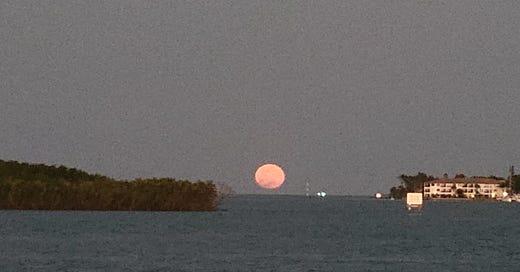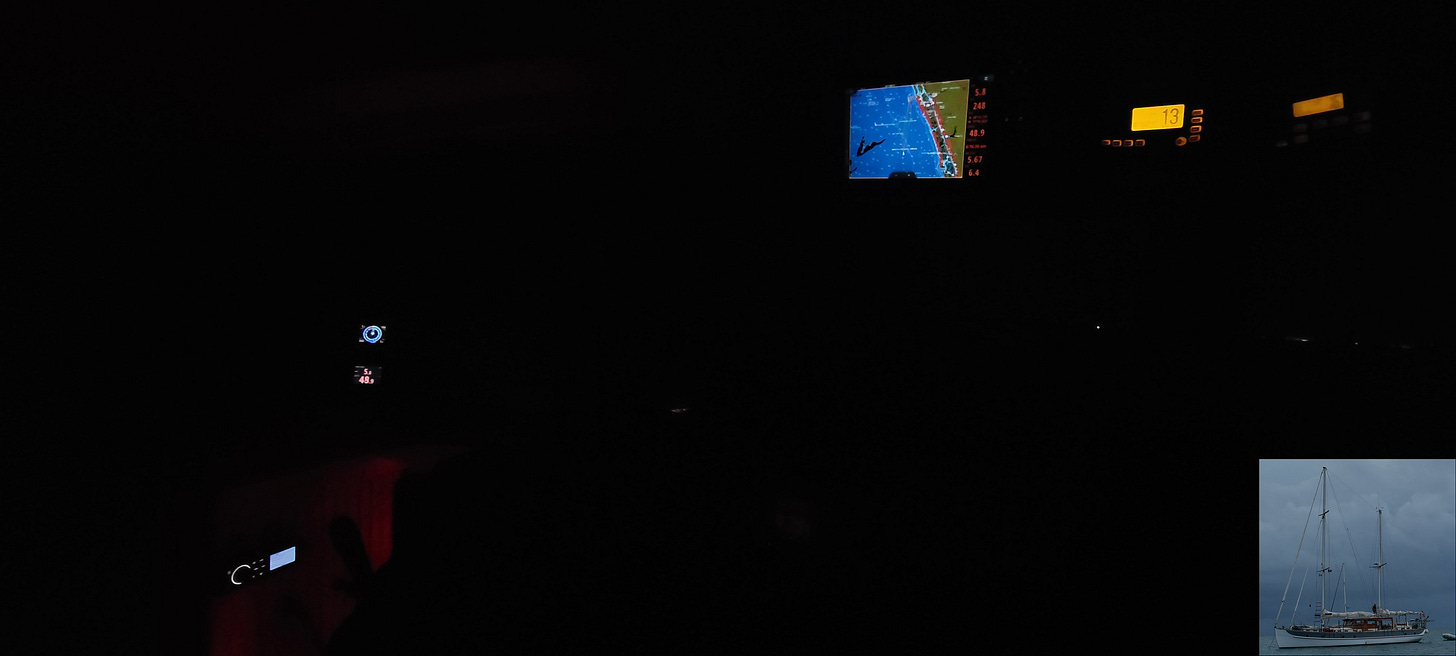I possess a brand new kind of faith, one that allows me to pilot forty tons of boat through a twelve thousand foot deep slice of ocean when I cannot see my hand in front of my face. This faith came to me gradually, very gradually, as I spent many night watches peering into blackness so impenetrable that it truly does envelope you. Dark Dark, I call it. Beyond dark.
I've tried to describe it before, many times, the absolute darkness that enrobes you at sea. As a descriptor, absolute works and yet...Dark Dark somehow intangibly gives you the best impression of not just how it looks but how it feels. Some time, perhaps many times, in your life, when you were trying to get your point across and were at a loss for words, you simply used an adjective twice for emphasis, such as, "The day was bright. Bright bright." And as redundant as that is, it gets the point across perfectly. Even though some of you may have never seen what we've seen, you get it. You can feel it. Dark Dark.
As a Sailor I track the cycles of the moon as when it is visible that celestial body brings much comfort. Tonight, there is none.



It is late winter in the Western North Atlantic; we are crossing the crevasse between the Abacos and Eleuthera in the Bahamas known as the North East Providence Channel. The sails are set for a brisk eastern trade wind, which is a perfect condition, perfect direction, for my southern course and the swells are comparatively gentle, low and slow. We waited for that, in the safety of Little Harbour, Abaco, and the conditions are as good we could ask for, with the exception of the phases of the moon. We are always SPARRING WITH MOTHER NATURE, but when we pulled up the anchor this evening, at least it felt like an even match.
I have seen not a single light since the beginning of my watch three hours ago. Not a ship, not a star, not a signal, not a crackle on the radio, not a sound except the lapping water and the occasional rustle of the sails. It’s one of those nights where you can’t see the horizon line. There is no differentiation between the black ocean and the featureless sky. A moonless night is Dark Dark. Aboard Steadfast, we have many passages under our belts, but very, very few of them have happened with the gift of the light of the moon. For a variety of random reasons, weather and timing and life and happenstance, we seem to undertake the longest night runs when the moon is new. When we tackle the Gulf Stream on our way home, sometime in the next two weeks, the moon will be waning, and then gone altogether, and then returning, but too early to assist.
With all intimidating things, with all things, really, there is an end. My standard helm watches (on Steadfast our shifts are four hour intervals) are 8pm-midnight and then 4am-8am; it works well for both Steve and me but was agreed upon particularly because I am a true lover of sunrise. For years now, I have done my best to see and capture every one.
Those sunrises are even more welcome on these darkest nights, and I can hardly express how early I begin to look for the first sign of dawn on the eastern horizon, how I wait for it. On a clear day the lessening of the darkness thankfully shows itself nearly seventy-five minutes prior to the official rising of the orb. It, too, comforts beyond words, to know that the night has passed, and soon my inadequate light-requiring eyes will be able to confirm the world around me instead of just guessing what might be out there.
I often imagine the days of old, the original blue ocean sailors and explorers, who were standing outside in all elements (we have a rugged teak pilothouse to shelter us) without any of the advantages you see in the photo below. On the right is a live GPS chart (map) display showing where we are as well as where we are going, the smaller screens on the left side are telling wind speed and direction, boat speed, current strength and depth. We use an auto-pilot, too, and that is a tremendous advance, making these passages less tiresome and less dangerous by reducing the possibility of human error. Even with all of those advantages, it’s still Dark Dark.
Early on in life we humans learn to light our way as we are not endowed with the tremendous gift of night vision. We have developed radar and headlights and flashlights and motion sensor lights to let us see, to warn us about what lies ahead. When you choose to travel upon the oceans at night, you have none of those things. You have only faith and modern technology. A new kind of faith.
This story was written in February of 2022. If you are enjoying my tales of SPARRING WITH MOTHER NATURE, please indicate that below! Thank you!






